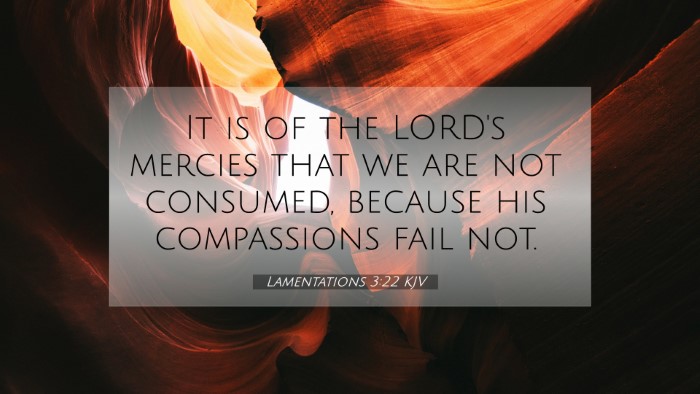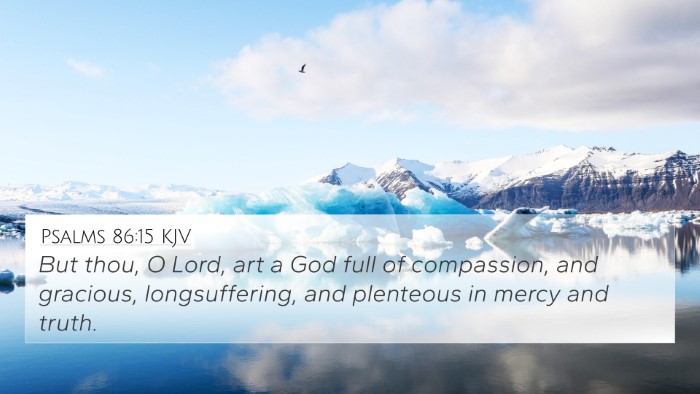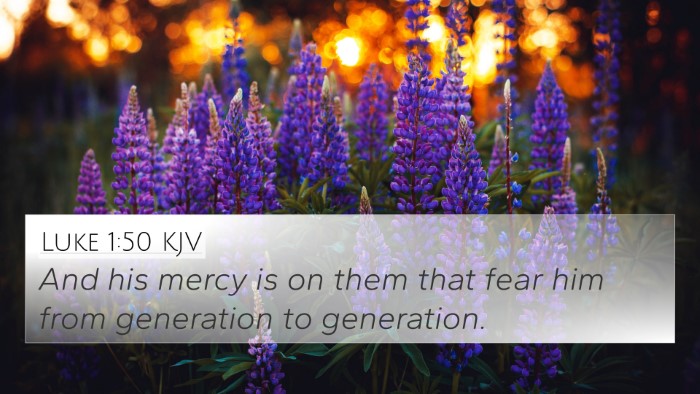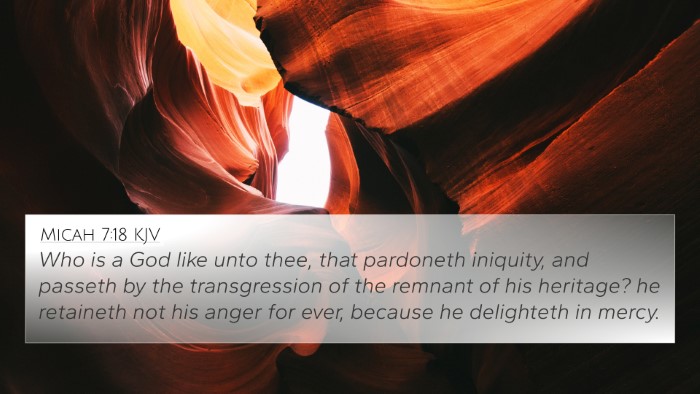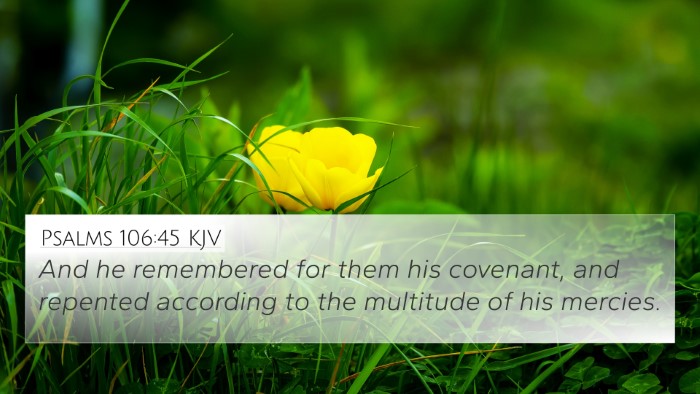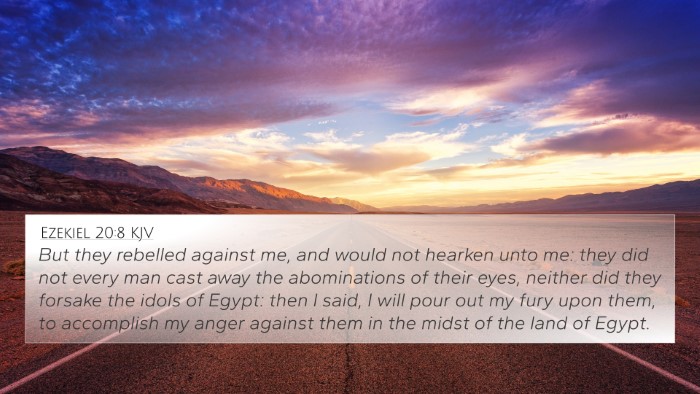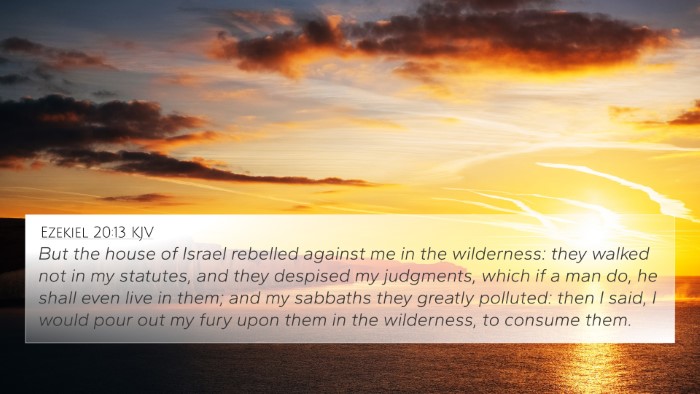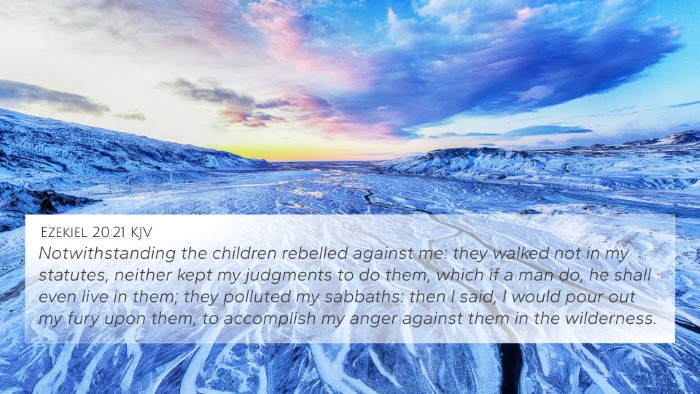Lamentations 3:22 - Understanding God's Faithfulness
Lamentations 3:22 states, "It is of the Lord's mercies that we are not consumed, because his compassions fail not." This powerful verse encapsulates the themes of mercy, compassion, and divine faithfulness amidst suffering. Through an exploration of this verse, one can appreciate the depth of God's love even in the face of despair.
Overview of Lamentations
The Book of Lamentations, traditionally attributed to the Prophet Jeremiah, is a poignant expression of sorrow over the destruction of Jerusalem and the suffering of its people. It serves as both a lament and a reminder of God's enduring grace.
Insights from Commentaries
-
Matthew Henry: Henry emphasizes that God's mercies are the source of hope for the afflicted. He highlights the profound truth that despite human sin and its consequences, God's compassion remains unfailing. Henry points out that each day brings new mercies, reaffirming God’s enduring presence among His people.
-
Albert Barnes: Barnes notes that the "mercies" of the Lord are part of His nature. He argues that we are sustained by God's compassion, which holds back the judgment we deserve. He expresses the idea that the constant renewal of divine mercy is evident in both daily existence and in moments of particular distress.
-
Adam Clarke: Clarke interprets this verse to reveal the constancy of God’s compassion. He underlines the importance of recognizing that while we often face trials, the unbroken kindness of God ensures we are not utterly lost. For Clarke, the verse serves as an assurance of hope among life's adversities.
Key Themes in Lamentations 3:22
This verse highlights several vital themes:
- Mercy: The unearned favor of God, allowing His people to endure trials without being consumed.
- Compassion: A reminder of God's empathetic love and kindness toward humanity.
- Faithfulness: An affirmation that God remains true to His character, providing hope in despair.
Bible Cross-References
Lamentations 3:22 connects deeply with numerous other Scriptures, enhancing its understanding and application. Some key cross-references include:
- Psalms 100:5: "For the Lord is good; his mercy is everlasting; and his truth endureth to all generations."
- Psalms 136:1: "O give thanks unto the Lord; for he is good: for his mercy endureth forever."
- Isaiah 54:10: "For the mountains may depart and the hills be removed, but my steadfast love shall not depart from you."
- 2 Corinthians 1:3-4: "Blessed be God, even the Father of our Lord Jesus Christ, the Father of mercies, and the God of all comfort."
- Romans 9:16: "So then it is not of him that willeth, nor of him that runneth, but of God that sheweth mercy."
- Micah 7:18: "Who is a God like unto thee, that pardoneth iniquity, and passeth by the transgression of the remnant of his heritage?"
- Ephesians 2:4-5: "But God, who is rich in mercy, for his great love wherewith he loved us, even when we were dead in sins, hath quickened us together with Christ."
Connecting Themes: Inter-Biblical Dialogue
The themes of mercy and compassion found in Lamentations 3:22 resonate throughout the Bible, creating a cohesive narrative. This cross-referencing of Biblical texts fosters a deeper understanding of God's attributes and His covenantal relationship with humanity.
Comparative Bible Verse Analysis
By exploring verses that share similar themes, readers can appreciate how God's mercy has been a constant throughout both the Old and New Testaments. The compassion shown by God in Lamentations is echoed in the teachings of Jesus, as demonstrated by His parables and actions throughout the Gospels.
Tools for Bible Cross-Referencing
To fully engage with Biblical texts and their connections, several tools can aid in effective cross-referencing:
- Bible Concordance: A comprehensive index that allows readers to easily find relevant scriptures based on keywords.
- Cross-Reference Bible Study: Guides and resources specifically designed to explore intertextual connections.
- Bible Reference Resources: These include study Bibles, commentaries, and software that enhance understanding of themes and teachings.
Conclusion
Lamentations 3:22 remains a vital scripture for recognizing God's unwavering mercy and compassion. The cross-referencing of Biblical texts not only enriches one's understanding but also affirms the intertwined nature of God's promises throughout scripture. By studying these connections, individuals can experience the profound assurances of hope that stem from God's enduring love and kindness.


